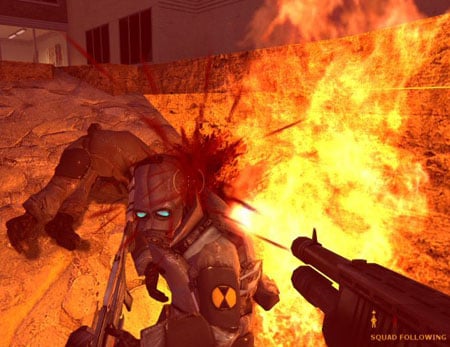This article is more than 1 year old
California ban on violent video games killed on appeal
Violent material protected. Porn? Not so much
A California federal appeals court on Friday a state law criminalizing the sale of violent video games to children is a violation of the right to free speech.
The law was first penned by Democrat senator Leland Yee and signed into law by Governor Arnold Schwarzenegger in 2005. But shortly thereafter, it was blocked by a federal judge, and it never took effect.
It sought to prohibit the sale or rental to minors of video games depicting serious injury to humans in a manner "especially heinous, cruel or depraved."
"Exposing minors to depictions of violence in video games, including sexual and heinous violence, makes those minors more likely to experience feelings of aggression, to experience a reduction of activity in the frontal lobes of the brain, and to exhibit violent antisocial or aggressive behavior," the legislation claimed.

Move out, you're constitutionally covered
It further alleged that even minors who don't commit acts of violence suffer "psychological harm" from prolonged exposure to violent games and that the state has a prevailing interest in protecting their tender, malleable frontal lobes.
Any game judged "patently offensive" to children based on the "prevailing standards in the community" sold in California would require a 2- by 2-inch solid white "18" displayed on the front of the case. Store owners caught selling violent games to underage tykes would face a fine up to $1,000.
The Ninth US Circuit Court of Appeals in San Francisco today upheld the lower court's decision declaring the ban unconstitutional.
In a 3-0 ruling, Judge Consuelo Callahan said California could only justify the ban if the state could not only prove violent video games caused actual psychological harm, but that the best way to prevent it was through criminalization. The court also shot down the act's labeling provision because it doesn't require the disclosure of purely factual information but compels carrying the legislature's "controversial opinion."
"In evaluating the State's asserted interests, we must distinguish the State's interest in protecting minors from actual psychological or neurological harm from the State's interest in controlling minors' thoughts. The latter is not legitimate," the ruling stated.
Defenders of the bill argued that America's accepted restrictions on sexually explicit materials to minors should be extended to materials containing violence. The State hearkened back to the 1968 case of Ginsberg v. New York, in which the Supreme Court held that the government can constitutionally prohibit children from accessing certain types of sexually explicit material even if the material isn't considered obscene for adults.
The court said it was wary of creating a new category of non-protected material based on the depiction of violence.
"The Supreme Court has carefully limited obscenity to sexual content. Although the Court has wrestled with the precise formulation of the legal test by which it classifies obscene materials, it has consistently addressed obscenity with references to sex-based material," the ruling stated.
The Entertainment Merchants Associated, which challenged the law, praised the decision.
"We are extremely gratified by the court's rejection of video game censorship by the state of California," said EMA president Bo Andersen in a statement. "The ruling vindicates what we have said since the bill that became this law was introduced: ratings education, retailer ratings enforcement, and control of game play by parents are the appropriate responses to concerns about video game content."
Andersen added that retailers are committed to assisting parents to assure children don't purchase games that are inappropriate.
A copy of the ruling is available here ®
